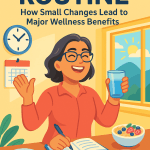This article is for informational purposes only and should not be considered medical advice. Always consult with a healthcare professional for personalized guidance.
Understanding Cancer Prevention
Cancer remains one of the leading causes of death worldwide, with millions affected each year. However, emerging research highlights that many cancers are preventable. By adopting specific lifestyle changes and staying informed about new findings, individuals can significantly lower their cancer risk.
What Does the Latest Research Say?
Recent studies have underscored the importance of a holistic approach to cancer prevention. Here are some key strategies supported by the latest evidence:
1. Embrace a Healthy Diet
Nutrition plays a pivotal role in cancer prevention. Research published in the Journal of the American Medical Association indicates that diets rich in fruits, vegetables, whole grains, and lean proteins can significantly reduce cancer risk. For instance, the Mediterranean diet, which emphasizes healthy fats like olive oil and nuts, has been linked to lower rates of various cancers.
Moreover, specific compounds found in foods, such as antioxidants in berries and cruciferous vegetables, can combat oxidative stress and inflammation, both of which are implicated in cancer development. Incorporating a variety of colors on your plate can ensure a broad spectrum of nutrients that work synergistically to promote health.
Interestingly, the pathophysiology of cancer often involves the accumulation of genetic mutations that disrupt normal cell function. Diet can influence these processes by modulating inflammation and oxidative stress, which are key contributors to the carcinogenic process. For example, studies suggest that the anti-inflammatory properties of omega-3 fatty acids found in fish can help mitigate these risks.
2. Regular Physical Activity
Physical activity is another cornerstone of cancer prevention. The CDC recommends at least 150 minutes of moderate-intensity exercise per week. Studies show that regular exercise not only helps maintain a healthy weight but also lowers the risk of breast, colon, and other cancers.
Exercise influences cancer risk through various mechanisms, including hormonal regulation and immune system enhancement. For example, physical activity can lower levels of estrogen and insulin, hormones that, when elevated, are associated with an increased risk of certain cancers. Additionally, exercise can improve gut health, which is increasingly recognized as a factor in cancer risk.
To incorporate more physical activity into your daily routine, consider breaking it down into manageable steps. Aim for 30 minutes of brisk walking five days a week, or engage in activities you enjoy, such as dancing or cycling. Joining a community fitness group can also provide motivation and support.
3. Avoid Tobacco
Tobacco use is the single largest preventable cause of cancer worldwide. According to the World Health Organization (WHO), smoking is responsible for approximately 22% of cancer deaths. Quitting smoking can dramatically reduce your risk of developing many types of cancer.
Even secondhand smoke poses a significant risk, contributing to lung cancer and other malignancies in non-smokers. If you or someone you know is struggling to quit, consider seeking support through counseling or cessation programs, which have proven effective in increasing success rates. The mechanisms by which tobacco contributes to cancer include the introduction of carcinogens that directly damage DNA, leading to mutations.
4. Limit Alcohol Consumption
Excessive alcohol intake is another risk factor linked to several cancers, including breast and liver cancer. The NHS advises limiting alcohol to no more than 14 units per week for both men and women. This moderation can help mitigate cancer risk.
Alcohol may increase cancer risk through several pathways, including the conversion of ethanol to acetaldehyde, a toxic compound that can damage DNA. Understanding your drinking habits and making conscious choices can significantly impact your long-term health. For those who drink, consider alternating alcoholic beverages with water to reduce overall intake.
5. Sun Safety
Skin cancer is one of the most common forms of cancer, yet it is highly preventable. Research published in the British Journal of Dermatology emphasizes the importance of sun protection. Wearing sunscreen, protective clothing, and seeking shade can significantly reduce your risk of skin cancer.
It’s essential to apply broad-spectrum sunscreen with an SPF of at least 30, even on cloudy days. Reapply every two hours, or more frequently if swimming or sweating. Regular skin checks can also help you catch any unusual changes early. Remember, UV radiation can also damage skin cells, leading to mutations that may result in cancer.
6. Stay Updated on Vaccinations
Certain vaccines can prevent cancers caused by viruses. For instance, the HPV vaccine can protect against cervical and other cancers, while the hepatitis B vaccine can lower the risk of liver cancer. The CDC recommends these vaccinations as part of routine healthcare.
Vaccination not only protects individuals but also contributes to community immunity, reducing the overall prevalence of these cancers. Discuss vaccination options with your healthcare provider to ensure you and your loved ones are adequately protected. It’s also worth noting that vaccines can help reduce the burden of cancer-related healthcare costs in the long run.
Screening and Early Detection
Regular screenings can catch cancers early when they are most treatable. The National Cancer Institute provides guidelines on when to get screened for various types of cancer, such as mammograms for breast cancer and colonoscopies for colorectal cancer. Staying proactive about screenings can be a life-saving strategy.
Consider creating a personalized screening schedule based on your age, gender, and risk factors. Engaging in discussions with your healthcare provider can help tailor your preventive care plan. Remember, early detection often leads to better outcomes.
Myth vs. Fact
Myth: All cancers are hereditary.
Fact: While genetics play a role in some cancers, lifestyle factors contribute significantly to cancer risk. Many cancers can be prevented through healthy choices.
Myth: Only older adults get cancer.
Fact: Cancer can affect individuals of any age. Early prevention and awareness are crucial for everyone.
Myth: If you eat healthy, you can’t get cancer.
Fact: While a healthy diet reduces risk, it does not guarantee cancer prevention. Other factors, including genetics and environment, also play a role.
Myth: Natural supplements can cure cancer.
Fact: While some supplements may support overall health, they should not replace conventional cancer treatments. Always consult with a healthcare provider before starting any new supplement regimen.
Patient Vignette
Consider Sarah, a 45-year-old woman who has a family history of breast cancer. After learning about the importance of lifestyle changes, she adopted a Mediterranean diet, started exercising regularly, and scheduled annual screenings. Two years later, during a routine mammogram, a small tumor was detected early. Thanks to her proactive approach, Sarah received treatment promptly and is now cancer-free.
Sarah’s story illustrates the power of informed decision-making and proactive health management. By implementing lifestyle changes, she not only improved her health but also increased her chances of early detection.
Frequently Asked Questions
What are the most effective cancer prevention strategies?
Adopting a healthy diet, exercising regularly, avoiding tobacco, limiting alcohol, and staying updated on vaccinations are key strategies.
How can I reduce my risk of skin cancer?
Use sunscreen, wear protective clothing, and avoid tanning beds. Seek shade during peak sun hours.
Is it too late to change my lifestyle to prevent cancer?
No, it’s never too late to make healthier choices. Even small changes can have a positive impact on your overall health.
How often should I get screened for cancer?
Screening recommendations vary by age and risk factors. Consult your healthcare provider for personalized advice.
Can stress cause cancer?
While stress doesn’t directly cause cancer, it can lead to unhealthy behaviors that increase cancer risk, such as smoking or overeating.
What role does sleep play in cancer prevention?
Quality sleep is essential for maintaining a healthy immune system and hormonal balance, both of which can influence cancer risk. Aim for 7-9 hours of restful sleep each night.
Are there specific foods to avoid for cancer prevention?
Processed meats, high-sugar foods, and excessive red meat consumption have been linked to increased cancer risk. Focus on whole, unprocessed foods for better health.
Conclusion
By staying informed about the latest research and implementing these cancer prevention strategies, you can take proactive steps toward reducing your cancer risk. Remember, every small change counts in the journey toward better health. Prioritize your well-being, and encourage those around you to do the same. Together, we can create a healthier future.
Key Takeaways
- Adopting a healthy diet rich in fruits and vegetables can lower cancer risk.
- Regular physical activity is crucial for maintaining a healthy weight.
- Avoiding tobacco is the most significant way to prevent cancer.
- Limiting alcohol intake can reduce the risk of several cancers.
- Staying updated on vaccinations can prevent virus-related cancers.
- Regular screenings are essential for early detection and treatment.
References
- American Cancer Society. (2023). Nutrition and Physical Activity Guidelines.
- CDC. (2023). Physical Activity Basics.
- WHO. (2023). Tobacco Fact Sheet.
- NHS. (2023). Alcohol Consumption Guidelines.
- National Cancer Institute. (2023). Cancer Screening Overview.
- British Journal of Dermatology. (2023). Sun Safety and Skin Cancer Prevention.
- PubMed. (2023). Dietary Patterns and Cancer Risk.
- UpToDate. (2023). Cancer Prevention Strategies.








Post a comment